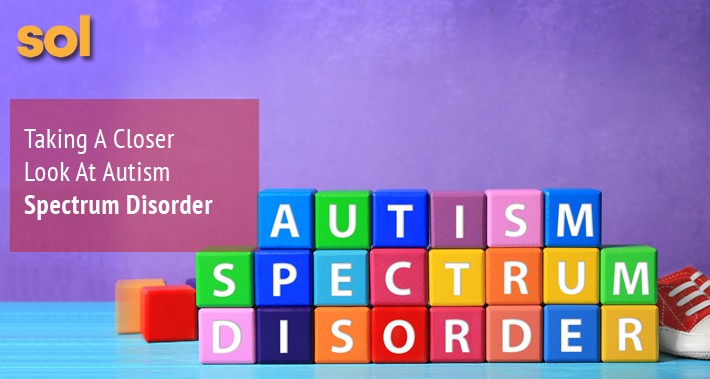
As a parent, you want what’s best for your child.
If they don’t seem to be developing at the same rate as other children their age, it can be worrying, and you may start to look for reasons for these delays.
One explanation could be autism spectrum disorder.
Conversely, sometimes autism goes undiagnosed in children but is then discovered when someone is an adult.
If this happens, it can shed light on reasons why you may not have felt like you “fit in” throughout your life.
Generally, if you make it to adulthood without being diagnosed as on the autism spectrum, it means your symptoms are less severe.
However, it can explain why, for example, you find certain social situations difficult.
Whether you’re a parent of a child on the spectrum, or a newly diagnosed adult, there are speech therapy for autism spectrum disorder.
Today we’re going to take a closer look at autism spectrum disorder and how speech therapy for children as well as adults can help.
Keep reading to learn more.
What Is Autism Spectrum Disorder?
Autism spectrum disorder, or ASD, is a developmental and neurological condition which can lead to social challenges and behavior differences.
Social issues related to autism spectrum disorder can include trouble with communication, as well as affecting behavior and learning.
What Is the Autism Spectrum?
Autism spectrum is an umbrella term used to describe a number of conditions which were previously diagnosed separately.
Conditions which now fall under the umbrella of autism spectrum disorder include:
- Asperger’s syndrome
- Pervasive development disorder not otherwise specified (PDD-NOS)
- Autistic disorder
- Childhood disintegrative disorder (CDD) or Heller’s syndrome
- Kanner’s syndrome
What Causes Autism Spectrum Disorder?
There is no one specific cause of autism spectrum disorder which researchers have been able to pinpoint.
Factors which can increase the risk of ASD include:
- Fragile X syndrome
- Tuberous sclerosis
- Certain medications taken during pregnancy, including valproic acid and thalidomide
- Other genetic changes or mutations
There is no credible evidence to support the claims that vaccines can increase the likelihood of developing autism.
Additionally, there is no credible evidence linking any specific ethnicity with an autism spectrum disorder diagnosis.
How To Tell If Your Child Has Autism Spectrum Disorder
If your child is displaying the following symptoms, it could be indicative of autism spectrum disorder:
Issues with social communication, including:
- Trouble making and keeping friends
- Being nonverbal (AAC can help here)
- Not understanding the meaning of words and trouble understanding the meanings of words in new contexts
- Literal interpretation of abstract ideas
- Has trouble recognizing emotions – both their own and of other people
- Unable to maintain eye contact
- Repeating words said by others
- Monotone voice
- Doesn’t share their interests with others
- Overshares their interests with others (info dumping)
- Unable to recognize nonverbal gestures
- Speech is stilted
Behavioral signs could include:
- Movements such as rocking, spinning, or hand flapping
- Has trouble dealing with change
- Inflexible behavior
- Extreme interest in niche subjects
- Not tolerating changes in routine
- Hypersensitivity to loud noises
In very young children and babies, who are not yet verbal, the following signs could indicate autism spectrum disorder:
- Not pointing
- Doesn’t recognize their name
- Poor eye contact
- Not expressive
It’s important to note, however, that because autism is a spectrum, each autistic person is different.
Autistic children may experience some, all, or very few of the above symptoms, and with varying degrees of severity.

A Note About Language For Autistic People
When it comes to speaking about autism, there are two different approaches – “person first” language, and “identity first” language.
Person first language suggests referring to “people with autism”, while identity first language uses “autistic person”.
In recent years, there’s been ongoing discussion on the matter.
However, the Autistic Self Advocacy Network, being led by autistic people, recommends identity first language.
As a result, that’s the language we use here on this website.
Is There A Cure For Autism?
No, and there is unlikely to ever be one.
Because autism spectrum disorder is a disorder in the way a child’s brain develops, it’s not something that can be reversed, even conceivably, without essentially wiping out somebody’s personality.
Is There A Difference In Gender With Autism Spectrum Disorder?
Boys and children assigned male at birth tend to have been diagnosed with autism spectrum disorder more often.
The ratio has traditionally been assumed to be about 4:1 for boys and children assigned male at birth (eg. transgender women), vs girls and children assigned female at birth (eg. transgender men).
However, more recent studies have shown that ratio is smaller than originally thought.
The study above assumes a diagnostic bias – as in, many girls and children assigned female at birth might meet the criteria for autism spectrum disorder, but don’t receive a diagnosis.
If Your Child Has Autism Spectrum Disorder, Do They Need Speech Therapy?
If your child is on the autism spectrum, speech therapy can help improve their symptoms and increase their chances for success in areas where individuals with autism tend to struggle such as social communication.
One key component is starting intervention such as speech therapy early on, as soon as you begin to notice symptoms, as getting a formal diagnosis can be time consuming.
Speech therapy can be used to help with all aspects of communication, including both verbal skills such as speech as well as nonverbal skills like interpreting gestures and keeping eye contact.
As well, it’s common for autistic children to also have childhood apraxia of speech, so your child may need treatment for that disorder as well.
Other interventions which can help children with autism may include:
- Interventions meant to improve social skills
- Training for parents to learn how to effectively communicate with children
- Occupational therapy to help with tasks such as handwriting
- Play therapy to improve communication and social skills
Although we are primarily focusing on children with autism spectrum disorder today, if you’re an adult who has realized later in life that you are on the autism spectrum, speech therapy for adults can benefit you as well, and will typically focus on the development of social skills.
Book An Appointment With Sol Speech And Language Therapy
Are you noticing your child doesn’t seem to be developing social skills at the same rate as their peers?
Do they display behaviors we’ve noted in this article such as delayed speech, difficulty in social situations, or trouble maintaining eye contact?
At Sol Speech and Language therapy, we can help.
Even if you haven’t yet been able to seek out an official diagnosis of autism spectrum disorder, as this can be costly and time consuming, we can help you to start addressing the specific issues you may be noticing in your child.
Providing speech therapy in Austin and Round Rock, and the surrounding areas, our team includes speech language therapists who can help address the speech difficulties your child may be experiencing.
Book your appointment with Sol Speech And Language Therapy today.
6448 E Hwy 290 Suite E-108,
Austin, TX 78723
(512) 368-9488
» https://g.page/r/CfRfhOpEQm7BEAE
Sol Speech & Language Therapy
555 Round Rock W Dr E-221,
Round Rock, TX 78681
(512) 808-3953
» https://g.page/r/Cb5pwCTosSEfEBM
Sol Speech & Language Therapy offers personalized skilled intervention to those struggling with their speech and language skills. Services offered include screening, consultation, and comprehensive evaluation. We also provide one-on-one and/or group therapy for speech sound disorders, receptive/expressive language delay/disorder, stuttering/cluttering, accent reduction, and much more.